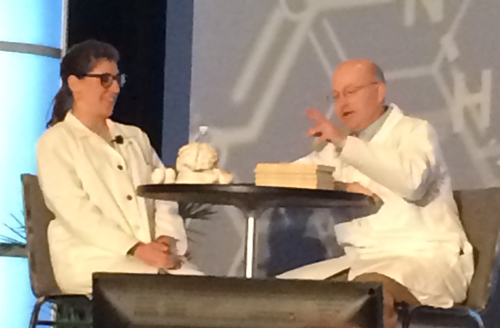Mayim Bialik shares her STEM inspiration
The Big Bang Theory actress speaks to the National Science Teachers Association
BOSTON – Mayim Bialik, an actress famous for her role as a neuroscientist on The Big Bang Theory, actually has a neuroscience Ph.D. in real life. But, as she told attendees at the National Science Teachers Association meeting, here, getting that degree was challenging. Rewarding? Yes. But not every neuroscientist is a natural.
“I arrived late to the world of STEM [science, technology, engineering and math],” she says. Bialik explains that she felt talented in art and other subjects but “…when it came to science and math I really shrunk. It did not come naturally to me to understand science and math concepts. That leads to a lot of shame and lot of fear.”
Bialik credits her love of science with a single person: a young biology tutor. At the time, Bialik was a successful teen actress but needed coaching in her science class. “This woman was the first female role model I had,” Bialik recalls, “and it was literally that one woman…who gave me not only the skill set…but the confidence that I could be a scientist.”

She went on to study neuroscience at the University of California, Los Angeles. Now, as an actress on most watched television sitcom, Bialik seeks to break the stereotype of what a scientist is like. “I try to put a positive face on STEM and a female face in STEM,” she explains, “a lone scientist in a laboratory is not what science has to look like.” She also collaborates directly with scientists and Texas Instruments, sparking student interest with projects like Zombie Apocalypse. It introduces students to the principles of both neuroscience and infectious diseases.
But Bialik notes that while she revels in playing a scientist on TV, every educator has the capacity to become a STEM star in students’ lives. “We are all in a position to touch a student and make them believe in science,” she says. The Big Bang Theory might make the geek chic, but she argues that it really takes a science teacher to inspire.
Power Words
neuroscience Science that deals with the structure or function of the brain and other parts of the nervous system. Researchers in this field are known as neuroscientists.
Ph.D. (also known as a doctorate) Advanced degrees offered by universities — typically after five or six years of study — for work that creates new knowledge. People qualify to begin this type of graduate study only after having first completed a college degree (a program that typically takes four years of study).
Follow Eureka! Lab on Twitter: @eureka_labs